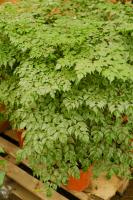How to Fix Stunted Tomato Plants
Tomatoes are one of the most popular fruits to grow in a vegetable garden. However, sometimes the plants may become stunted, which leads to smaller fruits and lower yields. Stunted tomato plants can be caused by a number of factors, including environmental stress, disease, and nutrient deficiencies. In this article, we will discuss how to fix stunted tomato plants and get them back on track.
Identify the Cause of Stunted Growth
The first step in fixing stunted tomato plants is to identify the cause of the problem. As mentioned, there are several reasons why a tomato plant may become stunted. Here are some common causes:
Poor soil quality
Lack of sunlight
Inadequate watering
Disease or pest infestation
Nutrient deficiencies
Once you have identified the cause of stunted growth, you can take the appropriate steps to correct the problem.
Improve Soil Quality
Tomatoes need well-draining, nutrient-rich soil to thrive. If your tomato plants are stunted due to poor soil quality, you can amend the soil by adding organic matter, such as compost or aged manure. This will improve soil structure and provide essential nutrients to your plants. You can also add a slow-release fertilizer that is specifically formulated for tomatoes.
Provide Adequate Sunlight
Tomatoes need at least six hours of sunlight per day to grow and produce fruit. If your tomato plants are growing in a shady area, you may need to transplant them to a spot with more sunlight. If this is not possible, you can try using reflective materials, such as aluminum foil, to reflect more light onto your plants.
Water Your Plants Correctly
Tomatoes need regular watering to prevent them from becoming stressed. However, overwatering can lead to root rot and stunted growth. To avoid overwatering, water your plants deeply once or twice a week, rather than shallowly every day. Make sure to also water at the base of the plants, rather than on the leaves, to prevent disease.
Treat Disease and Pest Infestations
Tomato plants can be susceptible to a variety of diseases, such as blight and wilt, as well as pest infestations, such as aphids and spider mites. If your tomato plants are stunted due to disease or pests, you will need to take appropriate measures to treat the problem. This may include using organic or chemical pesticides, removing infected plants, or rotating your crops to prevent disease buildup.
Correct Nutrient Deficiencies
Tomatoes need a balanced diet of macronutrients, such as nitrogen, phosphorus, and potassium, as well as micronutrients, such as calcium and magnesium. If your tomato plants are stunted due to nutrient deficiencies, you can add a fertilizer that is specifically formulated for tomatoes. You can also add organic matter, such as compost or aged manure, to provide nutrients to your plants.
Conclusion
Stunted tomato plants can be frustrating, but with a little detective work, you can identify the cause and take appropriate steps to fix the problem. By improving soil quality, providing adequate sunlight, watering correctly, treating diseases and pests, and correcting nutrient deficiencies, you can get your tomato plants back on track and enjoy a bountiful harvest.

 how many times do yo...
how many times do yo... how many planted tre...
how many planted tre... how many pine trees ...
how many pine trees ... how many pecan trees...
how many pecan trees... how many plants comp...
how many plants comp... how many plants can ...
how many plants can ... how many plants and ...
how many plants and ... how many pepper plan...
how many pepper plan...






























